The Benefits of Using ML & AI in the Travel Industry

In recent years, AI and machine learning have become a crucial part of various industries, including travel. As travelers become increasingly sophisticated in their needs and demands, travel companies must keep up with the ever-changing market.
By integrating AI and ML into their operations, travel companies can gather and analyze vast amounts of data to better understand their customers and improve the overall travel experience.
Cheap flights, affordable hotel prices, and lots of travel apps that help travelers plan and navigate their trip enabled people to travel more. No wonder digital travel sales are predicted to cross $950 BN by 2024. Such apps as Kayak, Booking.com, and Expedia disrupted the industry of travel agents and now are recreating that full-service experience by using machine learning for travel service development
By the way, traveltech projects supported by the Django Stars team can also perfectly illustrate what users expect from modern products in this industry.
In particular, PADI Travel, the US-based world’s #1 booking platform for scuba divers, covers a high-load booking engine, advanced filtering system, calendar and notifications, payment management system, location-based mobile application, a system for travel agents, admin CRM System, and PADI Travel dive guides.
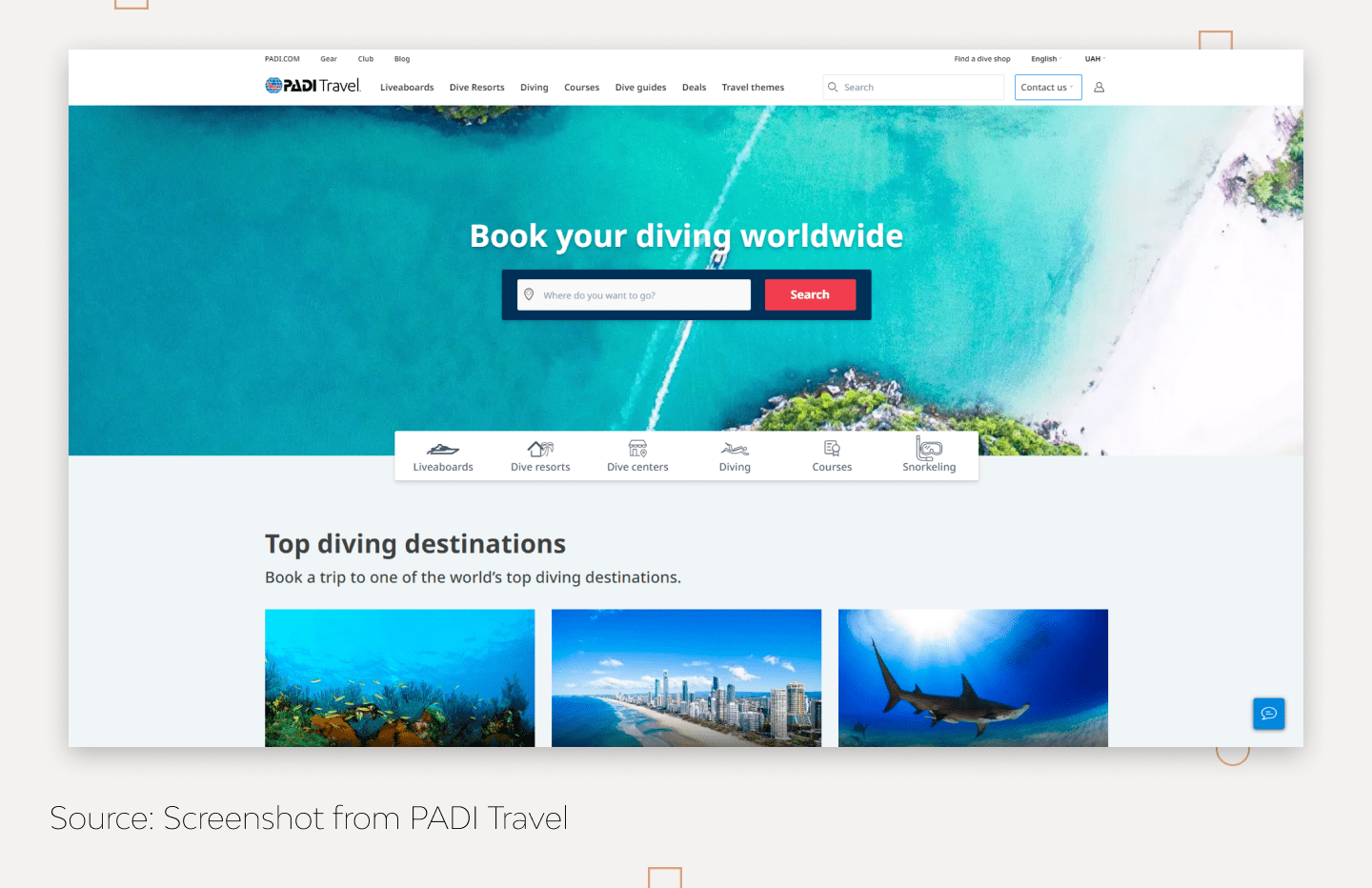
And if you look at Boa Lingua, the largest platform for language travel in Switzerland — it offers thousands of dynamically packaged services. It supports customers throughout their journey, from filtering to every part of the language school experience. Such operations were distributed among several systems, which Boa Lingua needed to bring together to accelerate processes and reduce maintenance costs.
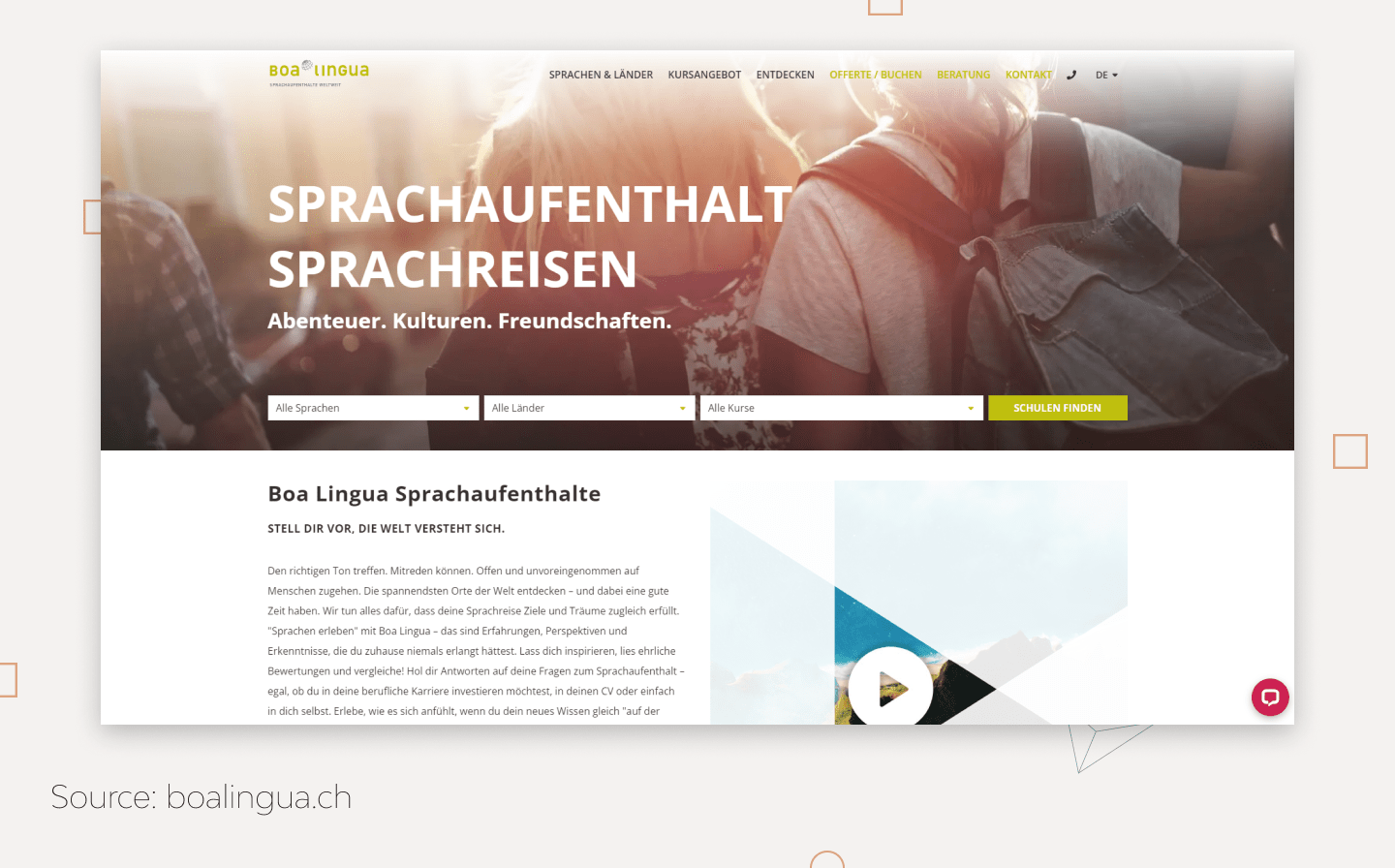
As painful as it can seem, people actually enjoy planning their trips and can spend 2 / 4 / (your option) hours glued to the screen to find the best place, the best itinerary, and the best price. And here’s when Machine Learning and Artificial Intelligence come into play: by analyzing large datasets, the AI-infused travel systems can generate super personalized suggestions for travelers.
By the way, using AI and ML capabilities is often part of the modernization of booking software services. Therefore, let’s take a closer look at what benefits machine learning brings to software.
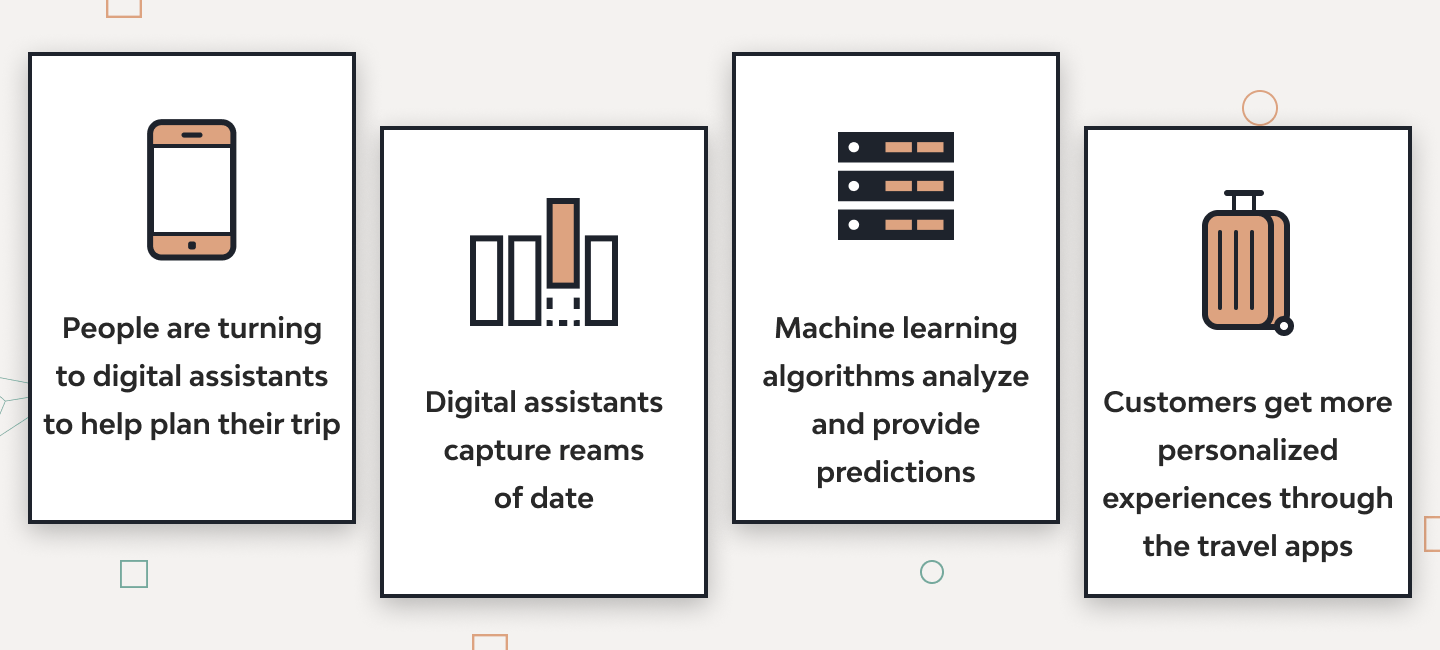
In this article, we will explore the growing importance of artificial intelligence and machine learning in the travel industry and its potential impact on the future of travel.
Nuts and Bolts of AI & ML
It’s getting harder to find a success story of how travel company X made technology improvement Y that increased sales by Z% without spotting the words “machine learning” or “artificial intelligence”. Sometimes used interchangeably, these two notions actually have different meanings.
Artificial Intelligence is a vast area of computer science that studies how to teach computers to think and act like a human.
Machine Learning is a subset of AI, important, but not the only one. In a nutshell, Machine Learning is about building models that predict the result with the high accuracy on the basis of the input data. Using statistical methods, it enables machines to improve their accuracy as more data is fed in the system.
The final output of machine learning models depends on the:
1) Quality of the data. The more data is diverse and rich, the better the machine can find patterns and the more precise the result. For example, here some ways how and which data can be captured by travel industry providers:
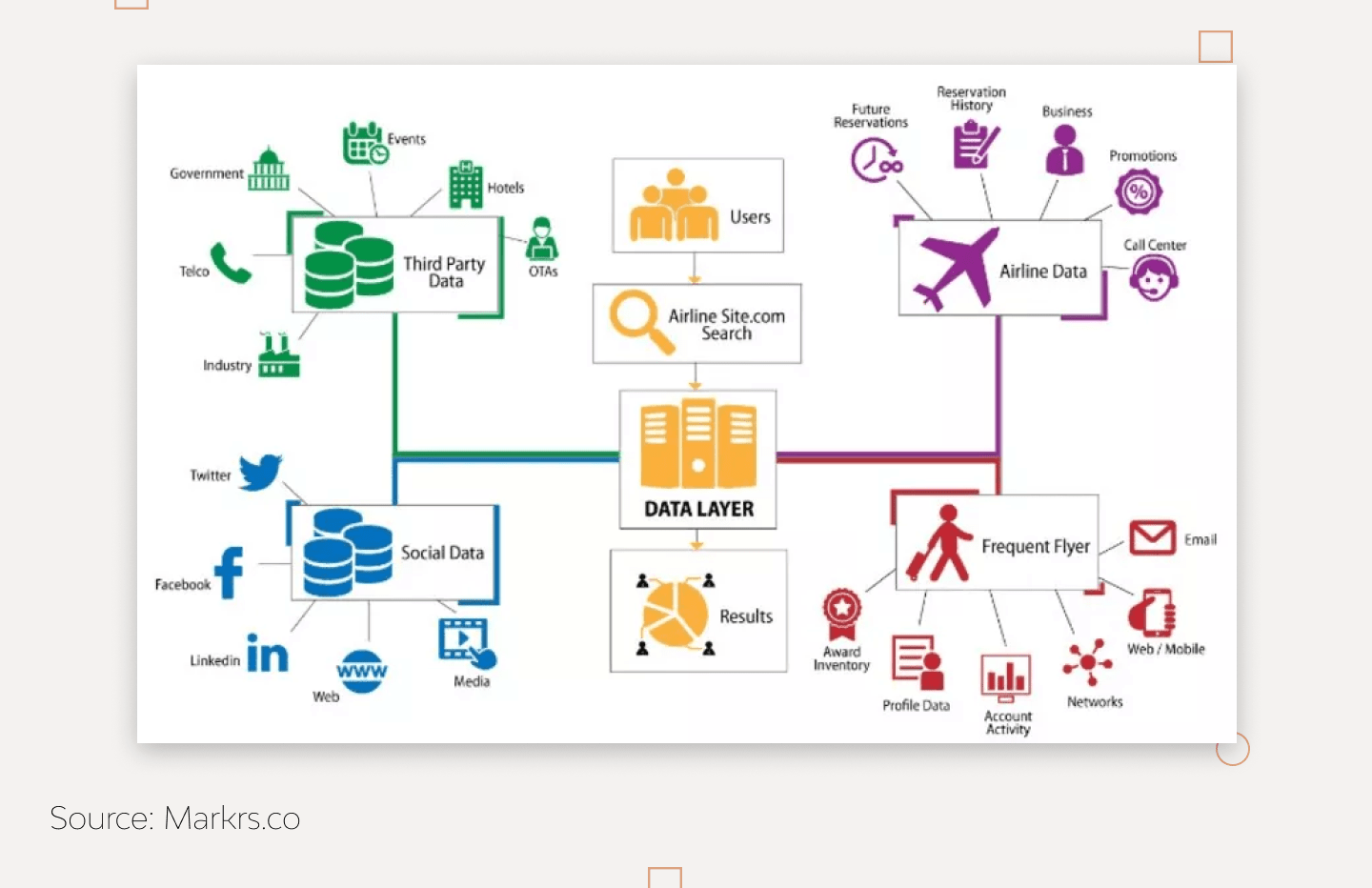
The datasets of good quality are usually in very high demand and the companies sometimes literally have to hunt for the decent datasets.
2) Features are meaningful inputs that the existing data contains, like user gender / location / browser extension etc. Usually data has more information that is needed to build the model, so it is necessary to select the important features. During this process, either the analyst or modeling tool selects or discards the attributes depending on how useful they are for analysis.

A multitude of features make the algorithm work slower, so usually the process of data preparation and having neat .xlsx and .csv files in the end takes more time than the whole process of training.
3) Algorithm that analyzes the data looks for patterns or trends and then finds the optimal parameters for creating the model. It’s quite a challenge to choose the best algorithm to solve a specific task as each algorithm can generate a different result and some of them generate more than one kind of result.
Here’s how Machine-Learning-powered model is built:

Machine learning model can outperform classical rigid business intelligence where business rules cannot capture the hidden patterns.
However, machine learning models may be implemented differently depending on their tasks and the specifics of a particular project.
Travel companies are actively implementing AI & ML to dig deep in the available data and optimize the flow on their websites and apps, and deliver truly superior experiences.
How Travel Companies Use AI & ML to Delight Customers
Travelling is a highly emotional experience and has an endless choice of options that fit each budget and type of traveller. Solo travel, corporate trip or family vacation – travellers with different goals on their mind want the app to suggest the correct packages right from the start. And here’s the proof: 88% of leisure travelers will switch to a different app or website if yours isn’t meeting their needs.
Artificial intelligence is becoming increasingly popular in the travel industry. Booking.com found out in its survey that almost a third (29%) of global travelers say they are comfortable letting a computer plan an upcoming trip based on data from their previous travel history, and half (50%) don’t mind if they deal with a real person or computer, so long as any questions are answered.
Currently, booking flights, hotels and rental cars has entirely turned into an online experience. Therefore, there’s lots of data on all our travel habits, which allows AI algorithms to pull out lots of insights and transform them into customized offerings and a new kind of experience.
Google’s CEO Sundar Pichai has already told how AI led the world:
Over time, the computer itself – whatever its form factor – will be an intelligent assistant helping you through your day. We will move from mobile first to an AI first world.
AI is a powerful tool to facilitate customer-travel provider relationships, instantly enriching the experience and providing that frictionless experience. Here are the most successfully realised implications of AI & ML in travel industry:
CHATBOTS
According to the HubSpot research report, 71% of people use chatbots to solve their problem fast. As of now, the biggest place where we see AI in the hospitality sphere is the chatbots for customer service. Customer care takes a very significant place in the travel industry, and chatbots allow to provide full-fledged customer support 24/7, reducing the load on personnel.
There are 2 types of chatbots:
First type is driven by a set of predetermined answers that are pre-programmed and driven by a set of rules. These need to be manually programmed and tend to represent a large set of frequently asked questions like:
- “What is the weather in Brooklyn tomorrow?”
- “When is the next flight to Paris?”
Second type is more complex and, driven by artificial intelligence, it understands language and commands and learns during interactions. It can answer some more complicated questions like:
- “Where does $150 take me?”
- “What is going on in New York?”
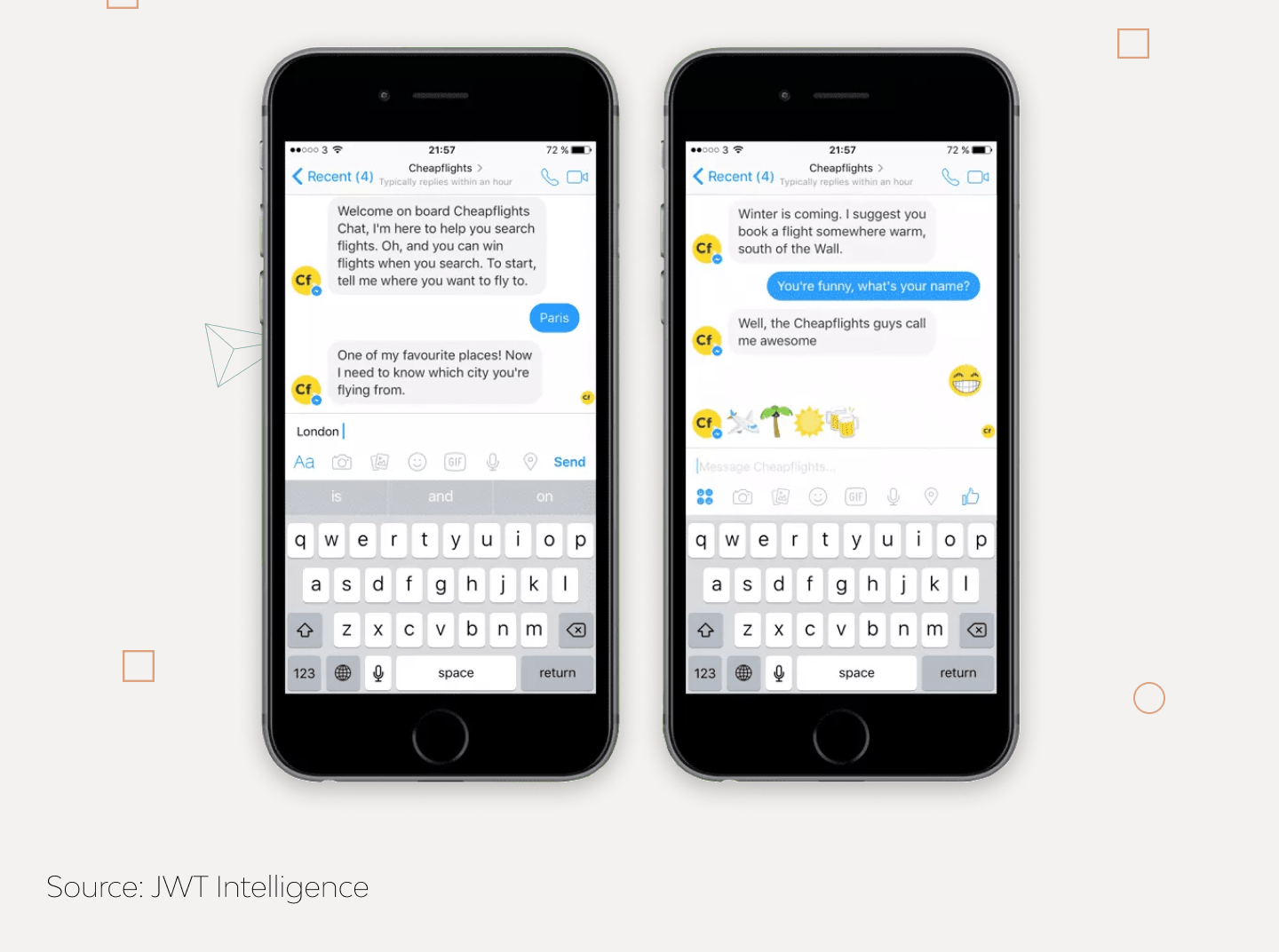
Instant answers at any time of day or night, providing comprehensive support, and as weird as it may sound, managing relationships with humans in a friendly manner. With the proper pre-programming, chatbots can empower the entire travel experience, starting from automated reminders before the arrival to suggesting nearby entertainment spots and transportation facilities at destination. By the way, learn how to create a Telegram bot using Django.
If travellers arrive at a new destination and bump into the sign plate “Closed” at the visitor information centre, no worries – in a few taps, they can launch a bot and ask for what they need. Actually, the bar that the customers set on the expectations from AI chatbot is quite high – they expect chatbot to solve their problems in a friendly manner and moreover, help in emergency situations. Integrating a voice AI bot could further enhance this seamless interaction, allowing for an even more intuitive and efficient user experience. Here’s how user requests might be formulated:
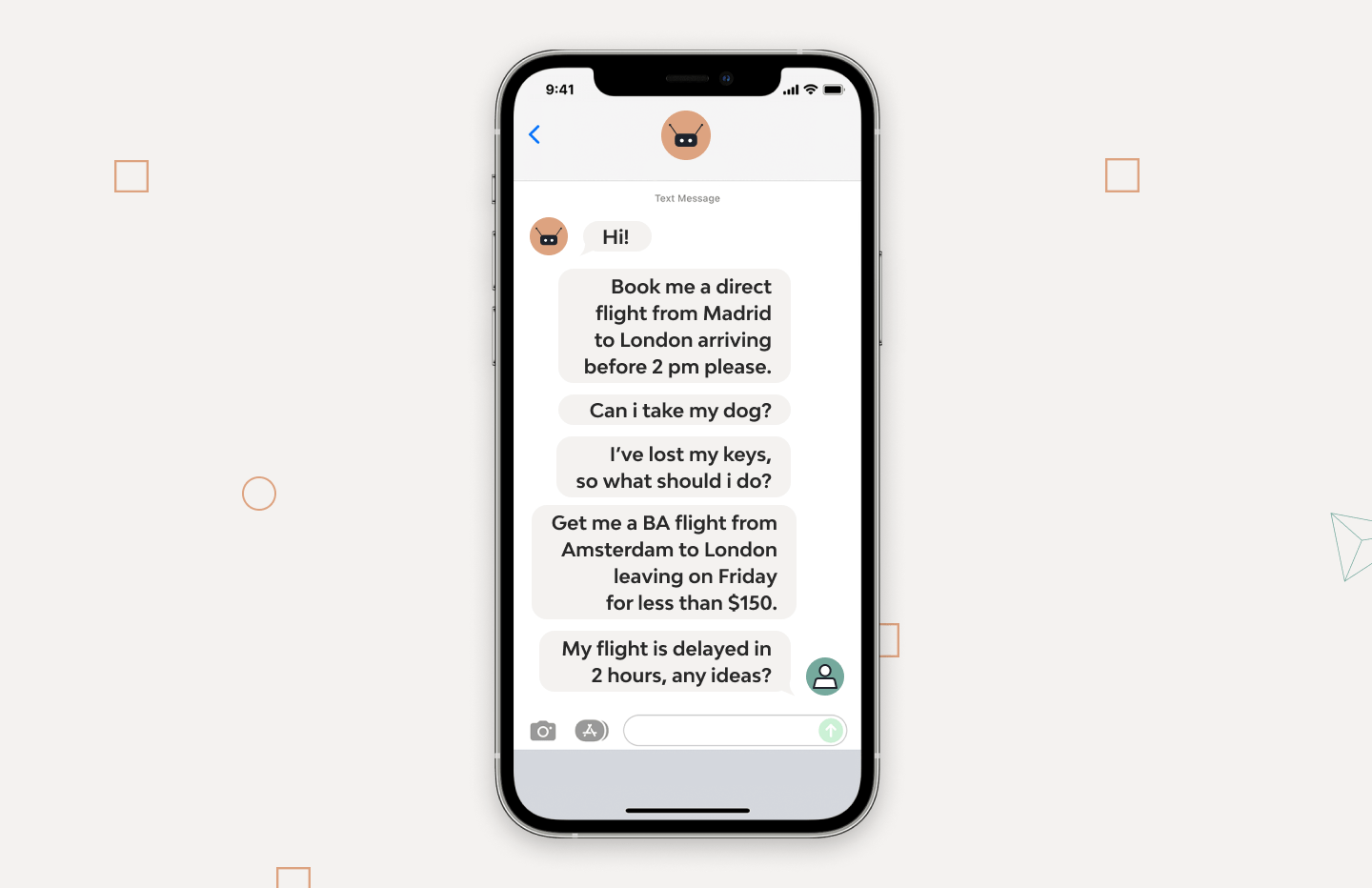
Kayak is well-known for incorporating bots onto the travel experiences. The bot will fully provide you with info on flights, rental cars, itinerary options and tell you some activities. What’s more, it sends the customers’ updates on future travel plans via messenger.
Kayak CEO, Steve Hafner, says,
There’s a whole generation who are more familiar with text messaging and voice via Siri looking for a different interaction with an online travel agency. We have voice interaction with Alexa, where you can actually talk to Kayak and say, “Hey Kayak, what’s the status of my flight to Denver later today? Where can I go this weekend for $300?”
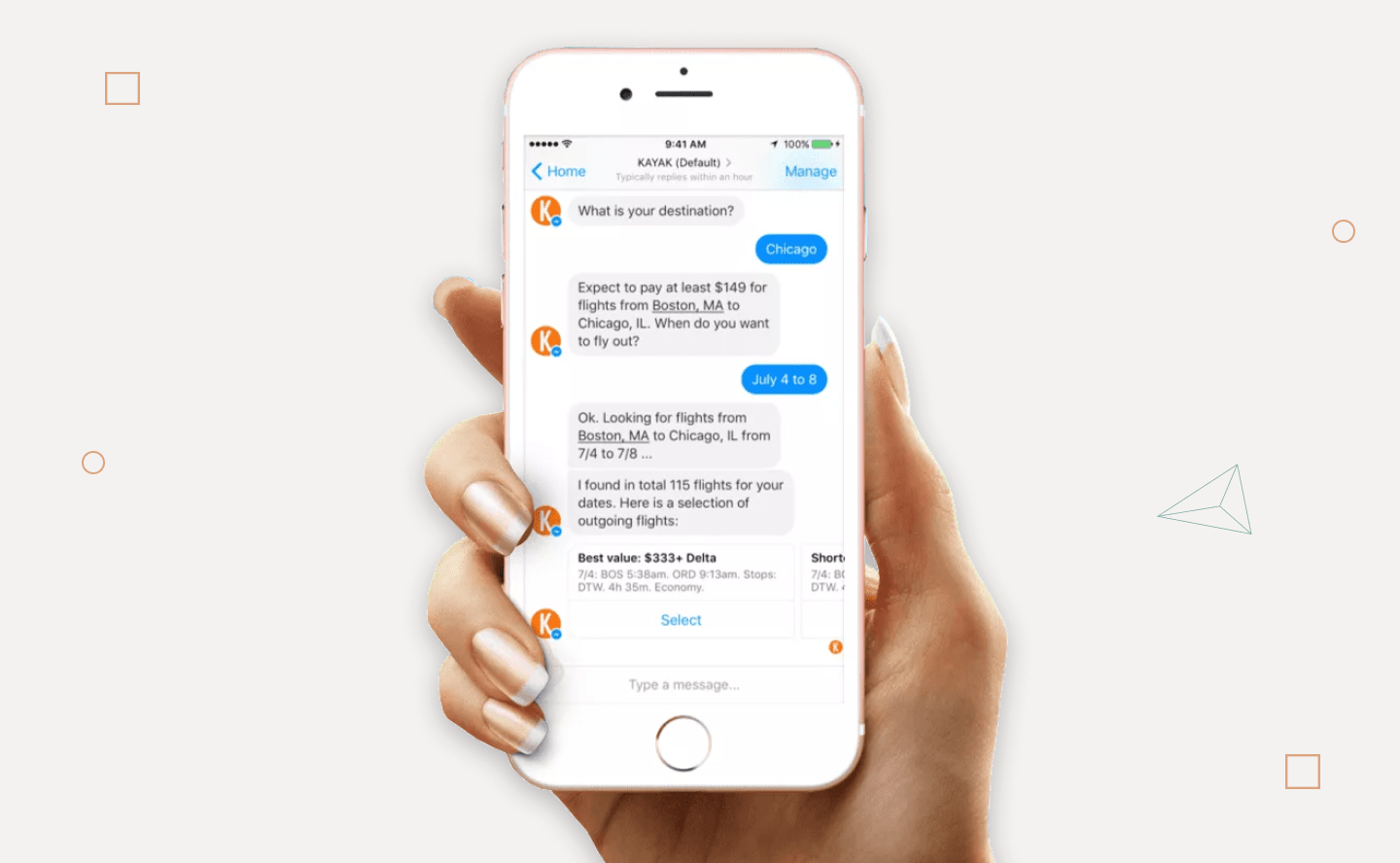
So far, there appear some great chatbots in the travel industry like Lola, which uses AI-augmented functionality to empower travel consultants so they can offer the perfect trip. AI-powered Mezi, a chatbot that can help with all travel arrangements in which AI is trained and improved by travel experts, or Sam, a chatbot that helps improve the expertise of travel consultants. Watson-powered “Connie” robot, that was developed for Hotel chain Hilton, uses Watson’s brain to assist guests with check-ins and recommend local attractions.
By the way, did you know that our company provides hospitality software development services?
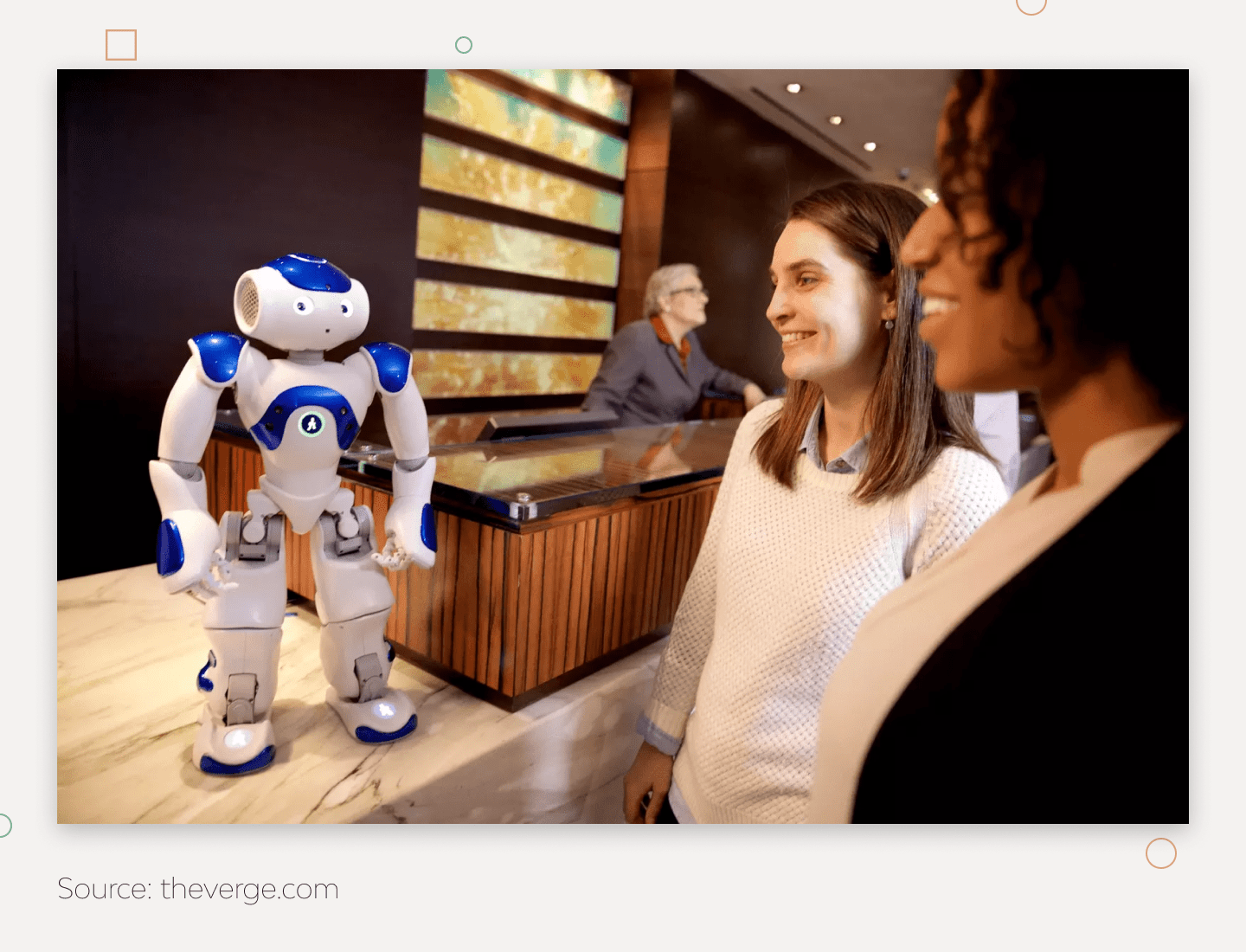
RECOMMENDER SYSTEMS
Youtube, Spotify, Netflix, Booking.com – these leading companies have one thing in common. This thing keeps their customers on the website for a long time, operates on history and real-time data, and generates a host of relevant propositions.
Oftentimes, travellers are overwhelmed with the information once they enter the travel website or app. On the other hand, it’s quite a challenge to respond to customers’ increasingly complex expectations in a correct manner. Hoteliers and travel providers that incorporated AI & ML in their business have an ace up their sleeve – by harnessing the big amounts of data, companies can investigate customers’ behaviors more closely and ultimately come up with the customized offerings.
Digital footprints of each customer on the travel platform allow the system to understand needs, budget and preferences of each customer, and suggest deals that would be a good fit. Delivering the right recommendations at the right time will help reinforce customers’ loyalty, keeping them coming back again and again.

The AI-empowered recommender systems can be fed either history data like the traveler’s previous bookings, behaviors or real-time data. For instance, when the person opens the email newsletter, it sends back a signal to a data scientist to incorporate that in the next touch.
After processing and aligning with the context of the traveller, an AI-empowered recommender system can provide the superior experience. Compare these two cases:
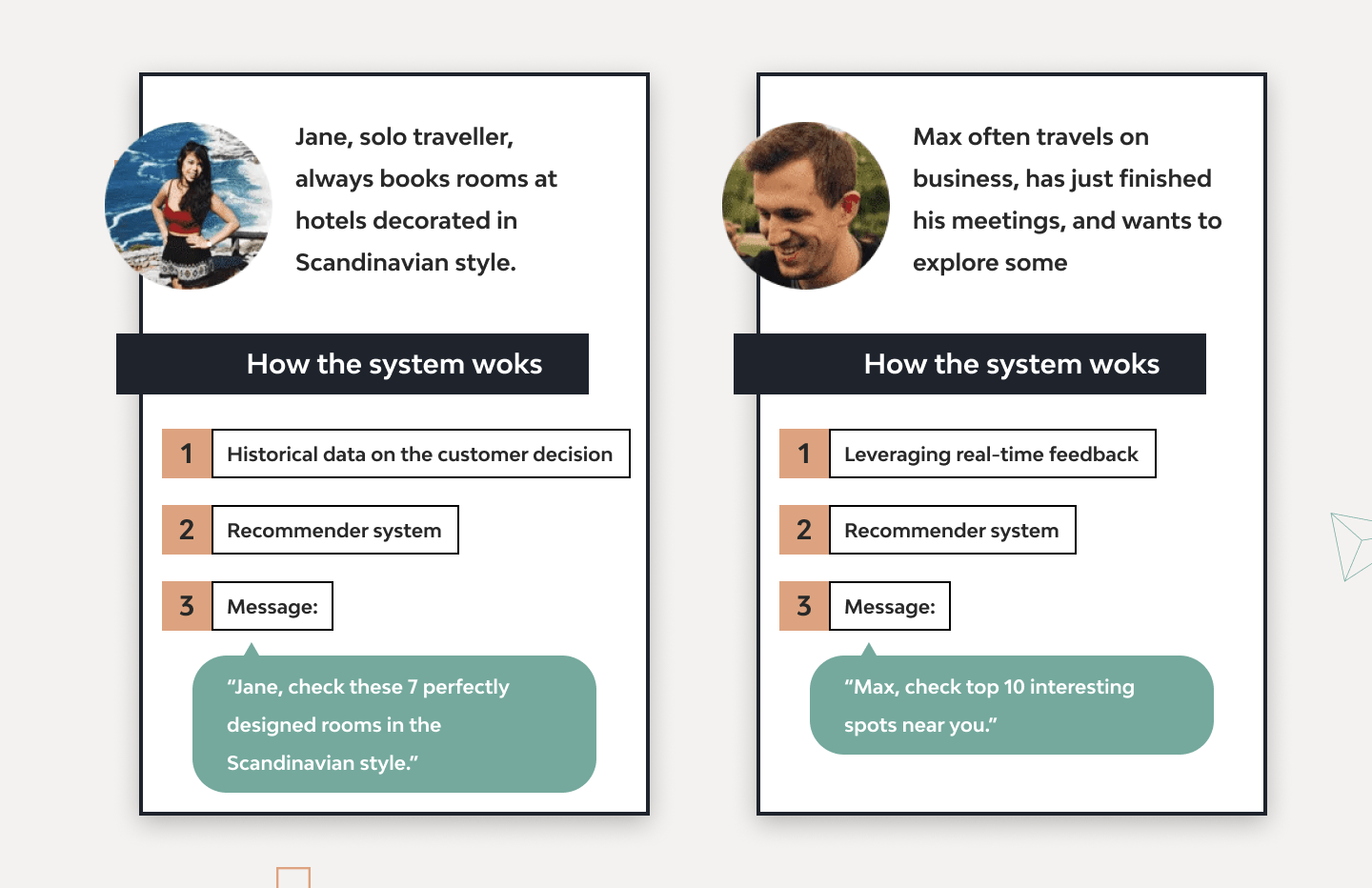
Such tailored recommendations will undoubtedly enhance the overall experience.
PREDICTIONS: FROM FLIGHT FARE TO HOTEL ROOMS AVAILABILITY
“When do airlines drop prices?”, “Are flights really cheaper on Tuesdays?” and a bunch of similar questions are typed into Google search field many times every day. Aren’t they the best evidence that people are eager to find the most optimal price on, sure thing, the option that appeared in their mind? It seems that everybody has had such a situation: you’ve just found a good flight deal, then returned back to the website in a while and whoa! – the ticket price ramped up (or if you’re lucky, fell down).
Flight price generation engine works according to certain rules and might take into account some of the following parameters:
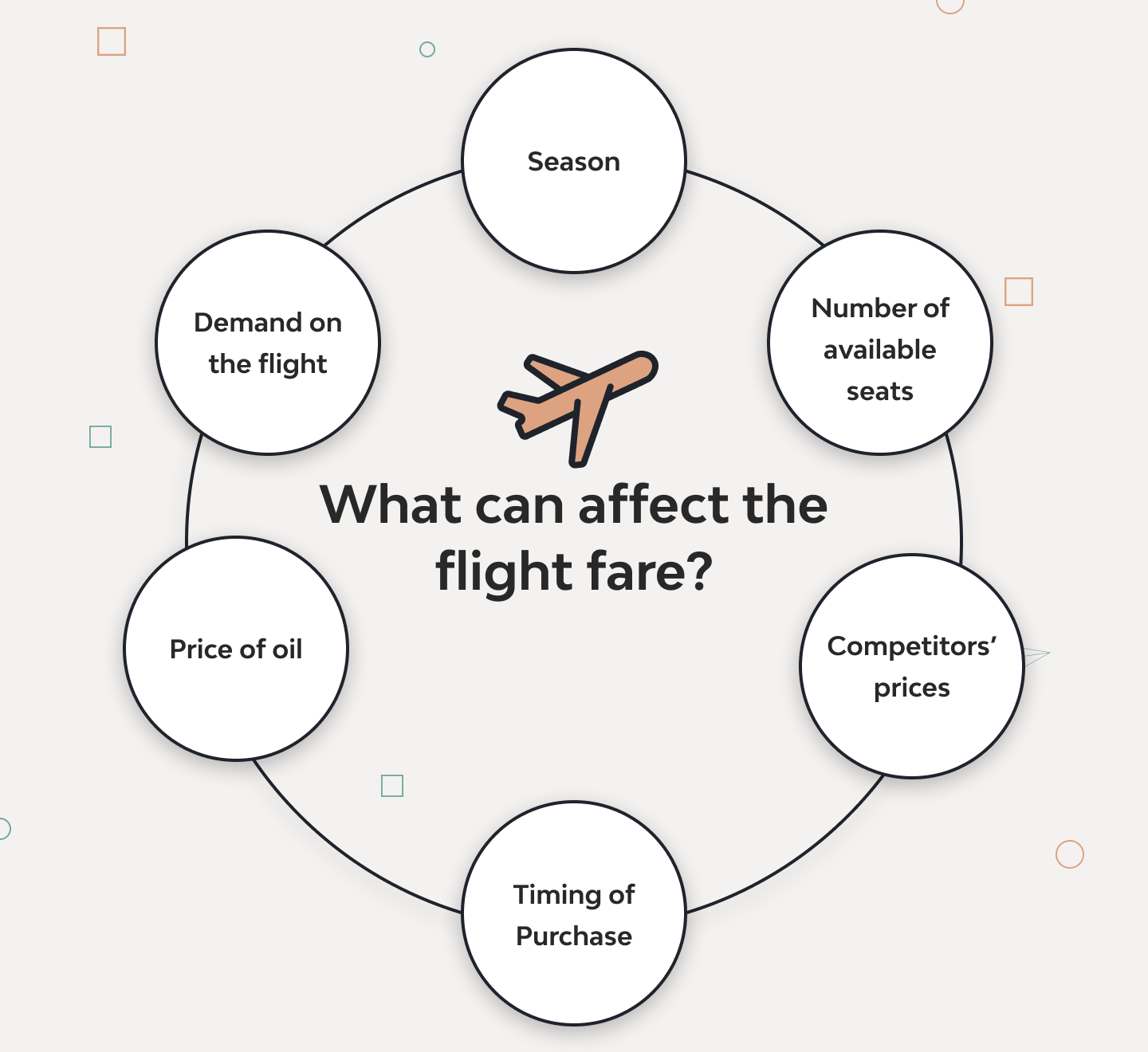
Machine learning is known for finding hidden patterns that a human’s eye might not even spot. For example, ML algorithm can detect anomalies after a big fare increase, taking into account a combination of features that caused such an increase.
Travel providers by leveraging machine learning can help travelers find the best time to book a hotel or to buy a cheap ticket. When the deal becomes available, the app will likely send notification to user.
For example, Hopper app, known for helping customers track best flight deals, has recently incorporated a functionality for choosing hotels; a ML algorithm implemented in the app will recommend whether to book a hotel or to wait for the price to drop, similar to how it works with plane tickets. Artificial intelligence and predictive analytics are at the heart of this drive. Using the color-coded calendar, which marks expensive with red, moderate with yellow, and the cheapest with green, Hopper lets users view which dates will be more expensive than others:
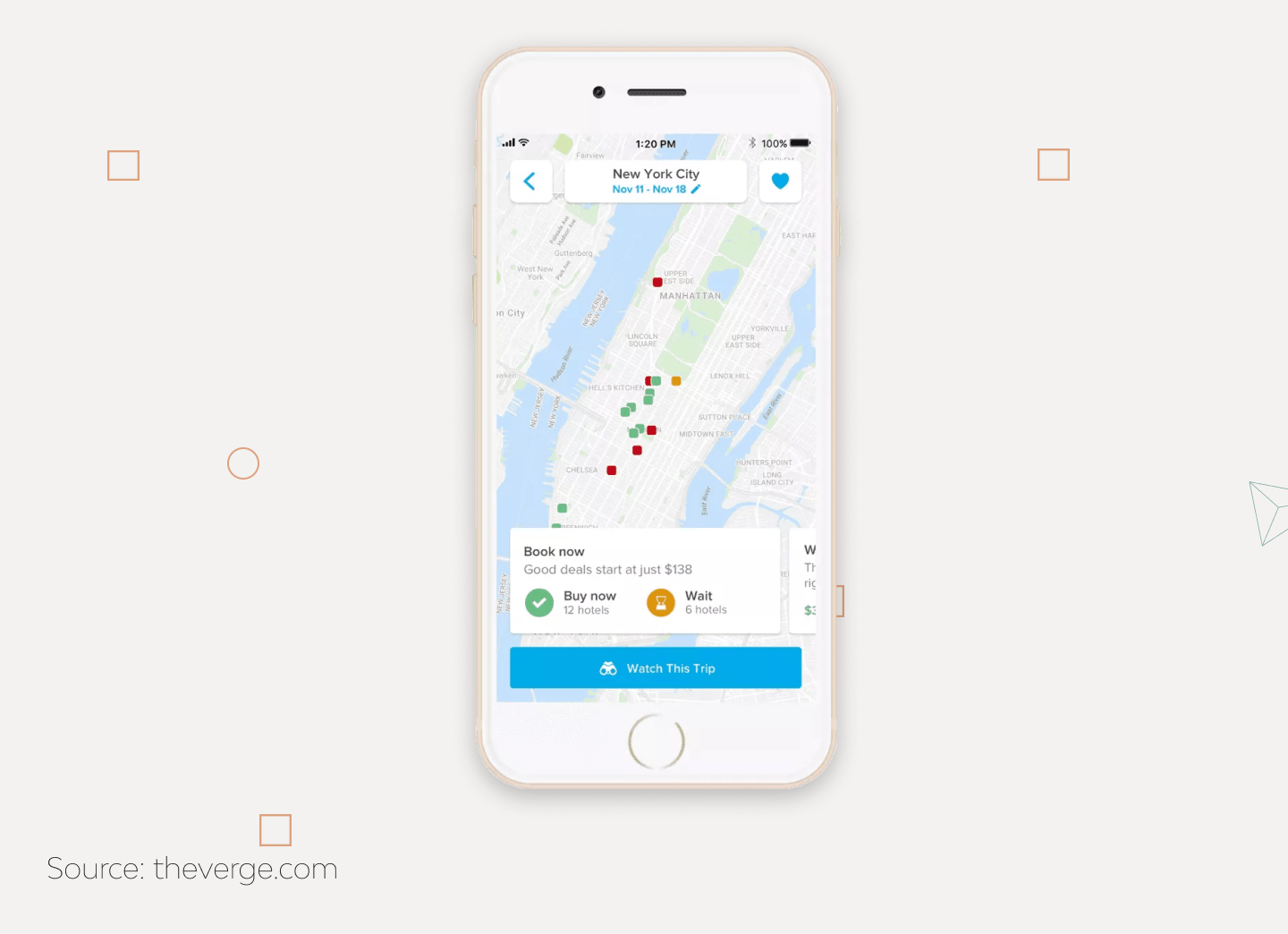
CONTENT CURATION
Content is the king when it comes to brand-customer interactions, and travel & hospitality industry is not an exception. A photo on the website, a push notification in the mobile app, a new incoming email, these are only a few touches with the whole content machine that provides travellers all the needed info. Inform, inspire, interact, drive conversations – top-notch content always triggers the users to activity on the website.
As a rule, content curation is a human-depending process; however, AI & ML might help here offering personalization and automating some routine tasks.
Trip Advisor, while redesigning its website, noticed that there are lots of great photos on their website (over 110 million); however, you could never know which photos will show up first. That is why the engineering team decided to improve the way photos will be shown in different contexts.
The team could ask property owners to rate photos, select the main photo for their listing, and tag photos by the scene type. After that, they had to hire an army of photo moderators to tag, rank, and select photos, but that would be slow and expensive.
The engineering team approached this task from Deep Learning standpoint. Deep Learning is a subset of Machine Learning that is specialised on the neural network architecture development and training. The team developed a model that selected attractive and relevant photos and then showed them in priority on the website. Just compare their Hero photos before/after implementing the Deep Learning model:
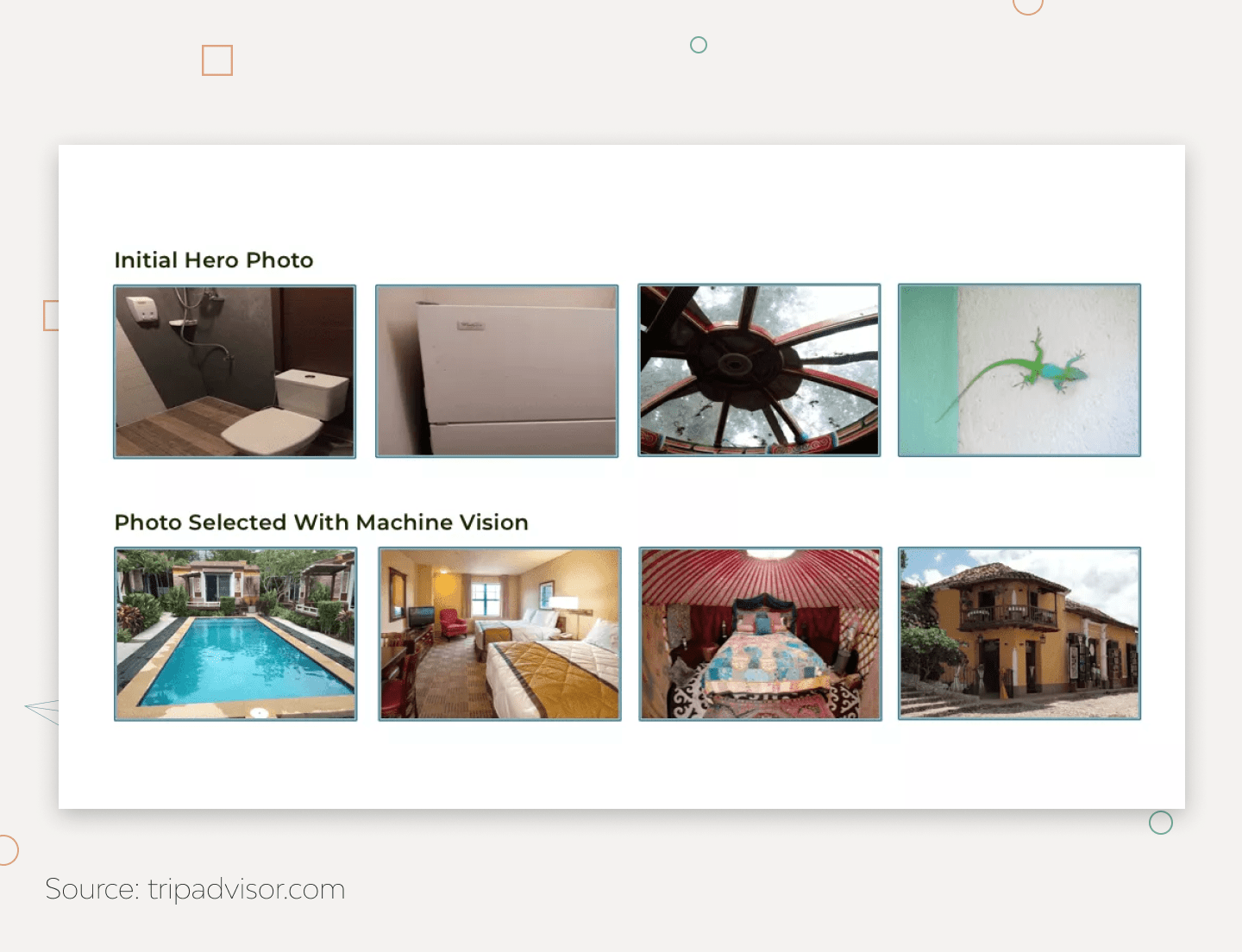
One more transformative example of AI application in content optimization is translation management by Booking.com. They are known as by far the biggest travel operator that provides relevant communication with Neural Machine Translation (NMT) – property descriptions, room descriptions and hotel names are translated across 43 languages:
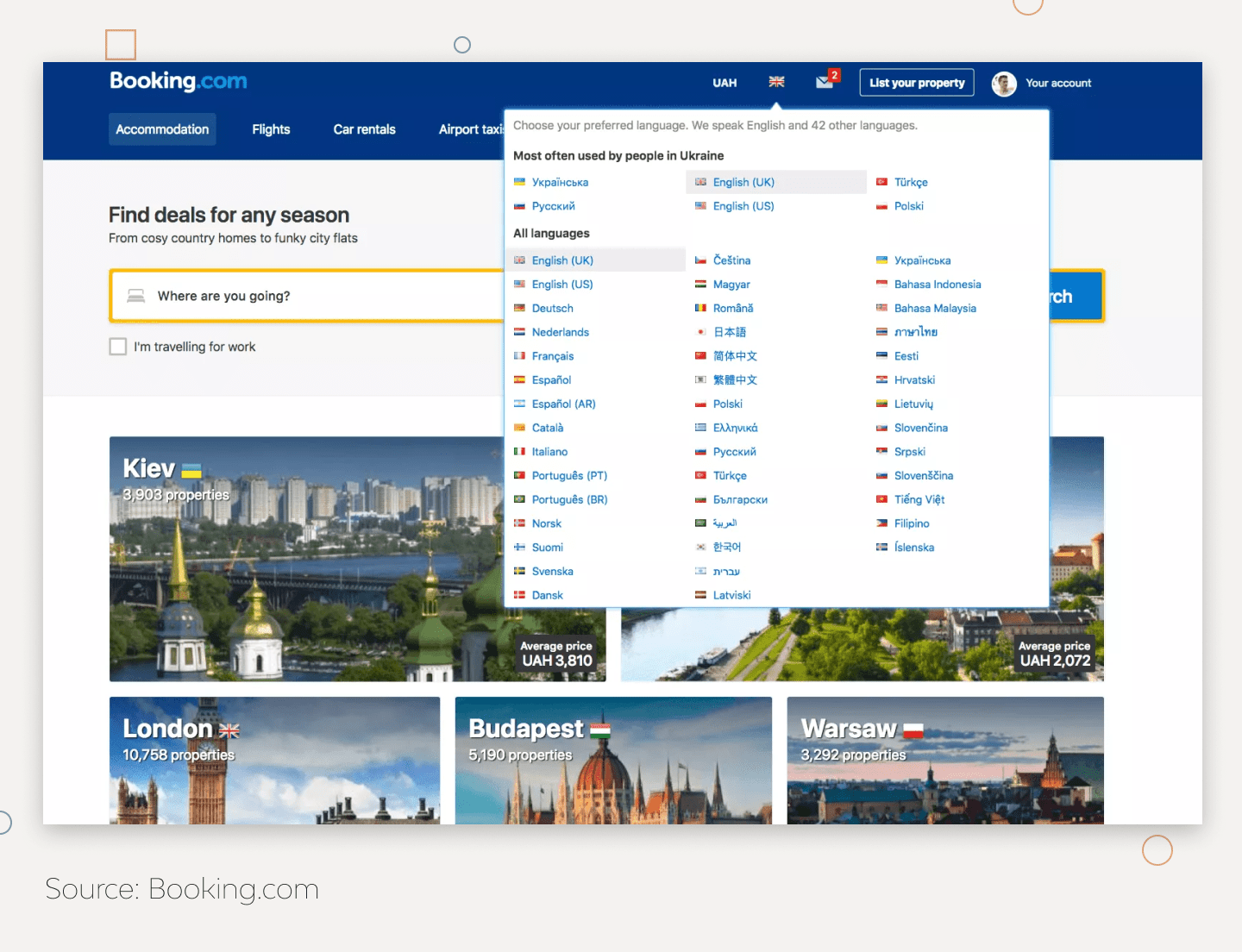
User experience management
For businesses in travel industry, your website’s/app’s customer journey is critical to the company success. Some stats to prove that: in fact, 38% of people will stop engaging with a website if the content or layout is unattractive.
ML can infuse the customer journey at different points: from inspiration, research, experience to sharing the impressions with family & friends. There are two main challenges the travel providers are struggling with in terms of UX:
- Optimise the way users interact the interface from the clicking-type-tap mode to more conversational
- Make the process of choosing the options easy and fast
Artificial Intelligence can actively learn from every interaction on the website and therefore optimize that user flow. Are there too many touchpoints? What will be the recommendation at each point of customer journey? What contextual hints should pop up at each stage?
Applying AI & ML to UX will help understand how customer experience should be designed.
Reams of data allow to track:
- What are the things customers care about most?
- What are the customers’ segments?
- Where are people falling off during their journey and, most importantly, why?
- How does the customer lifecycle look like?
- How fast can user find something?
James Waters, Global Director of Customer Service at Booking.com, says
As we operate in an industry that is incredibly personal, emotional and complex, maintaining the right balance between genuine human interaction and efficient automation is something we’re always trying to fine-tune and optimize throughout every stage of the consumer journey.
Skyscanner analyzed the customer journey the user goes through while using the app and found out that in order to get what he wants, the user has to make minimum of 9 steps and 17 taps in the app. After that, the company made a tilt shift towards building a conversational interface with AI-based chatbots.
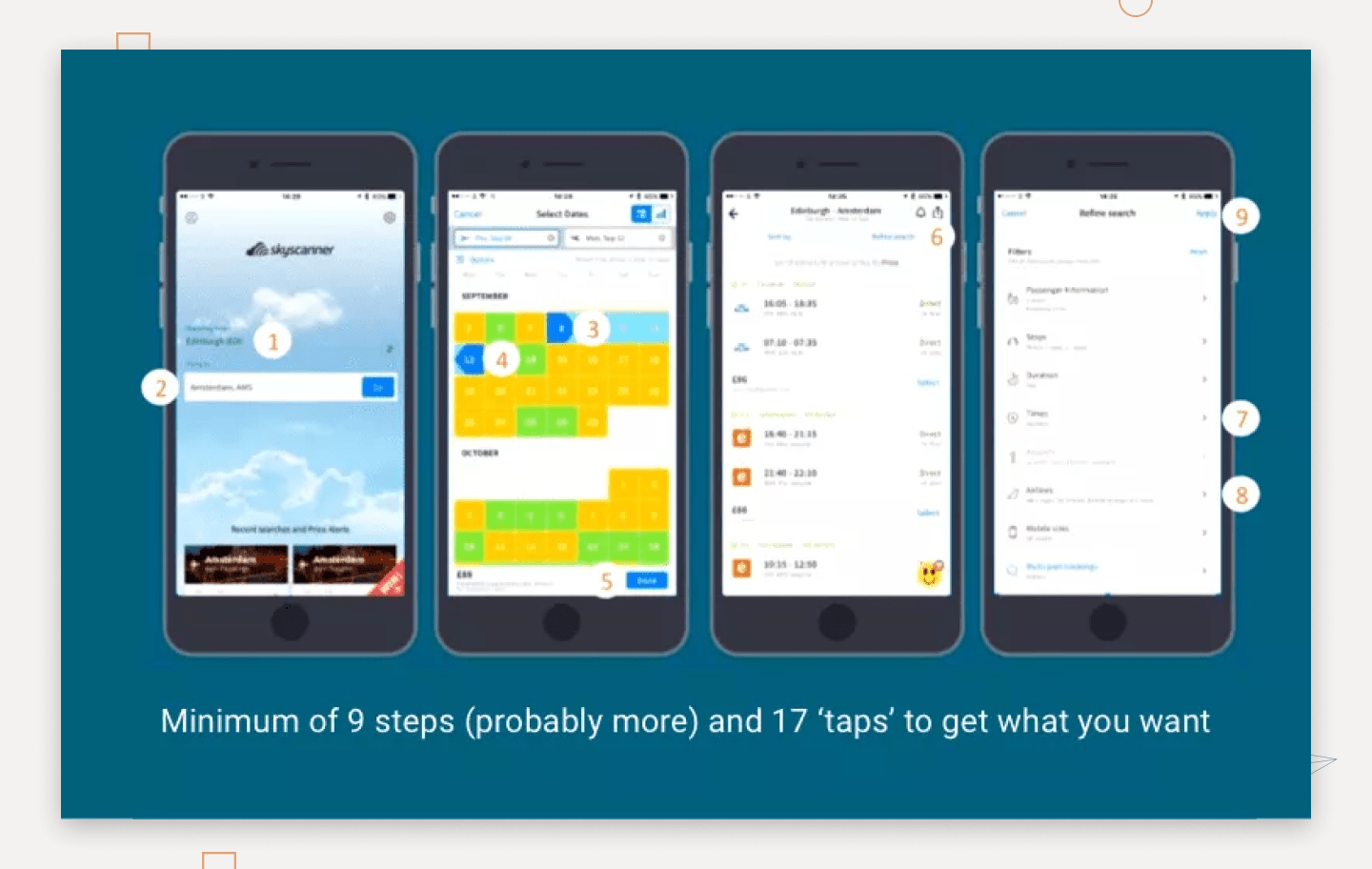
Travel companies will provide more relevant experiences by tracking metadata such as:
- The means you prefer to leave the airport
- Your companions you are travelling with
- Whether it is a business trip
- Solo/group
- What’s the weather at the location
Machine Learning and Data Analytics in the Travel Industry: Transforming Business Operations
Let’s switch gears from customer benefits to tourism business benefits as AI & ML can be applied to align business processes in a number of cases:
SALES OPTIMIZATION
AI-powered models can empower sales managers on all the stages of sales funnel:
- Discovery phase helping customers find where to go
- Engagement phase by figuring out what option is best for each customer
- Conversion & Retention phases by working on crowdsourcing data
Travel history, previous behavioral patterns, purchase history and belonging to loyalty program – if such data is fed to AI- based system, it can help sales teams generate personalized travel packages.
Tourism can benefit from AI & ML models that can help upsell/cross-sell products via the app. For instance, if the customer prefers driving a car on business trips and is looking for some hotel offers, the algorithm will get rental car offers out of the entire pool of suggestions.
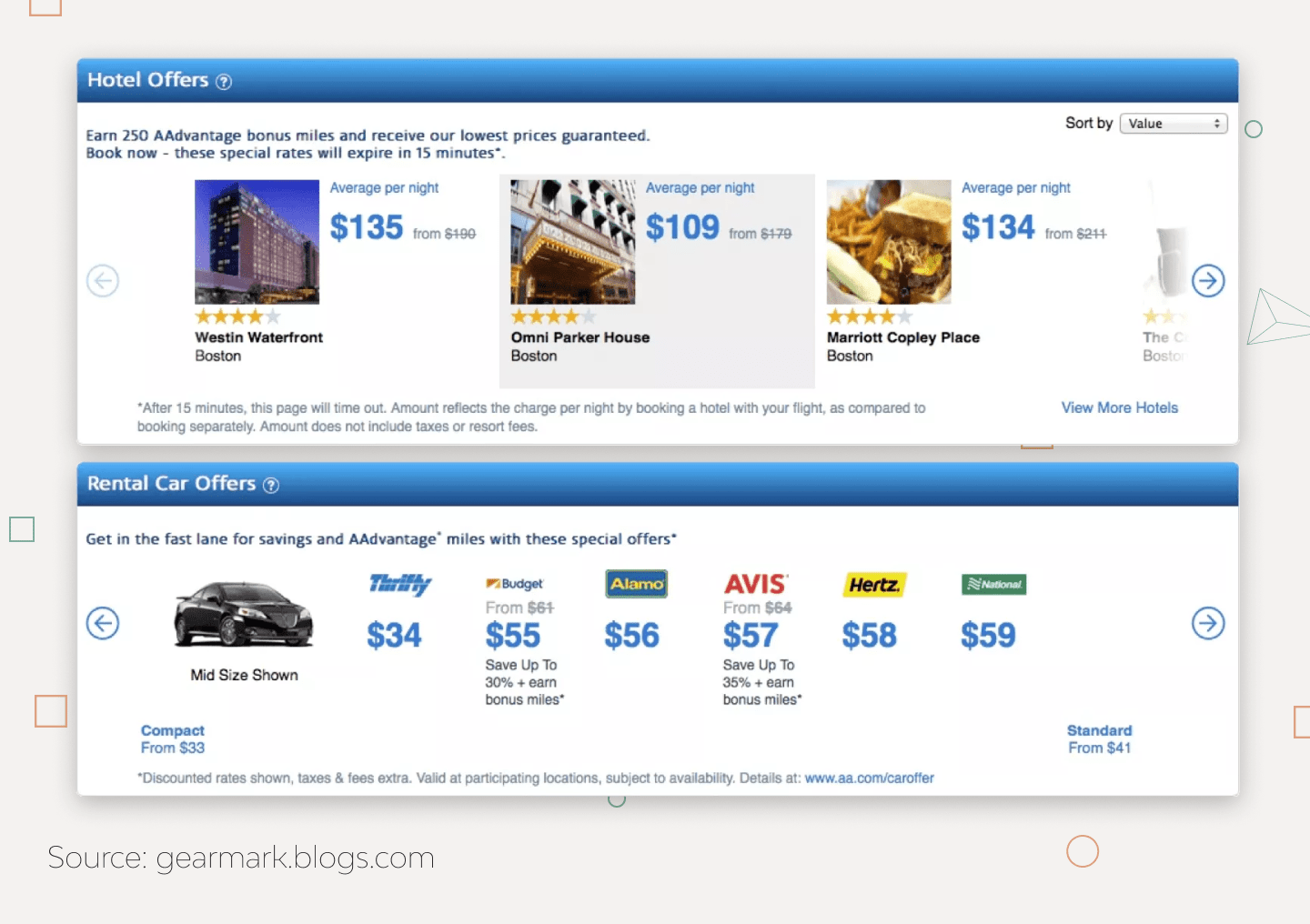
PRICE OPTIMIZATION
Dynamic pricing technology infused by AI can help pinpoint buying patterns so accurately that airlines can synchronize their pricing strategies in real-time and present the right price at the right time. Such features can be actively used in airline software development.
Let’s look at Hopper as an example: it encourages travellers to make smart purchases with their data-driven technology, which is at the heart of their app. Every user has specific features such as preferable days and time to fly, time to buy tickets, convenience etc. The system automatically detects the right tradeoffs between price and product features and delivers the relevant offers at the right time and at the optimal price.
Hopper writes in their blog that 90% of their sales directly depend on app notifications:
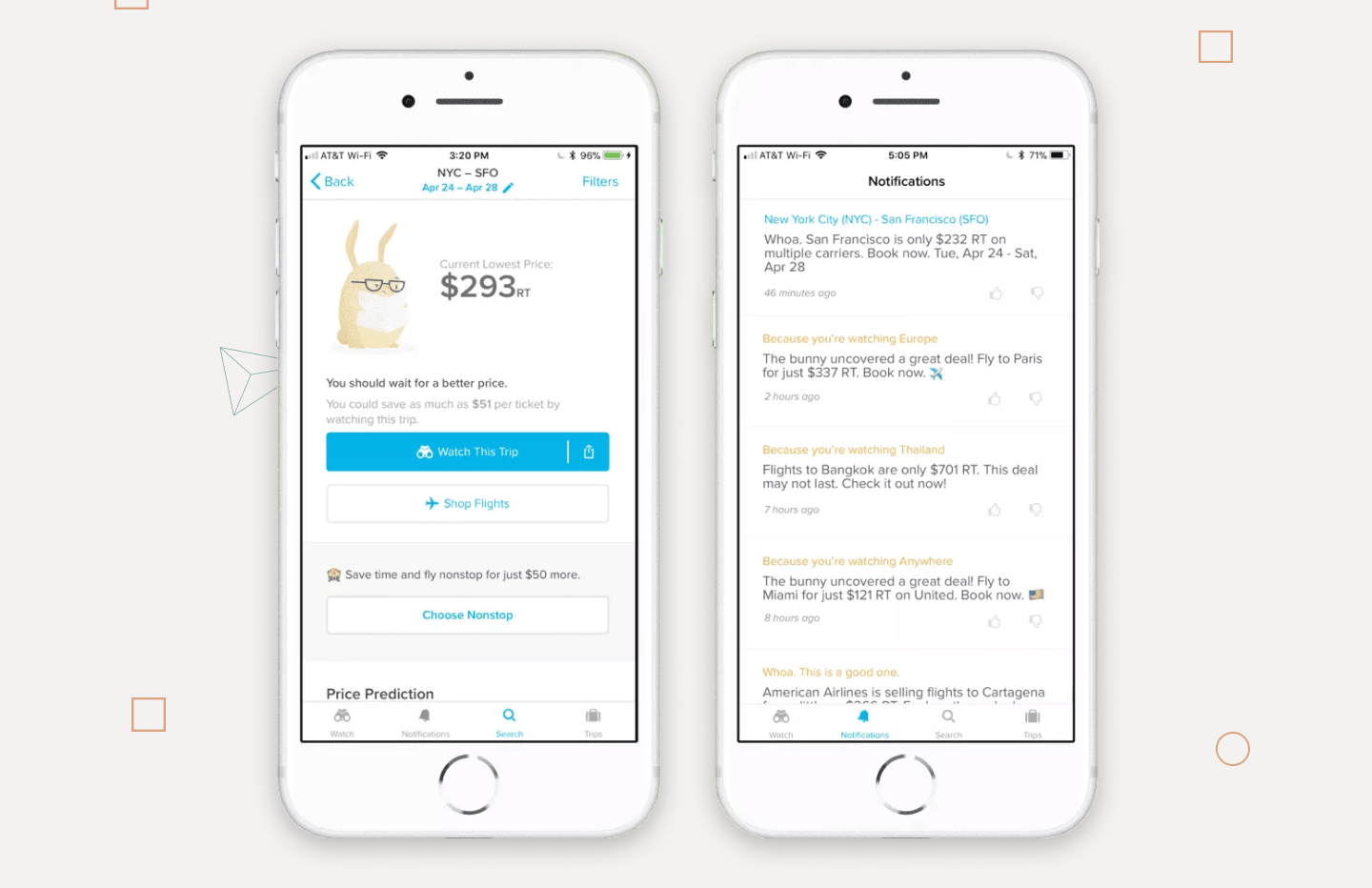
When the company’s most revenue comes from a particular amount of customers (like with Pareto Rule), why not optimize the prices for the company’s loyal customers?
For instance, when the system has a request for one day from a new customer vs 5 days from a loyal customer, the system can generate prices for these 2 different types of customers.
OPPORTUNITIES FOR MARKETING
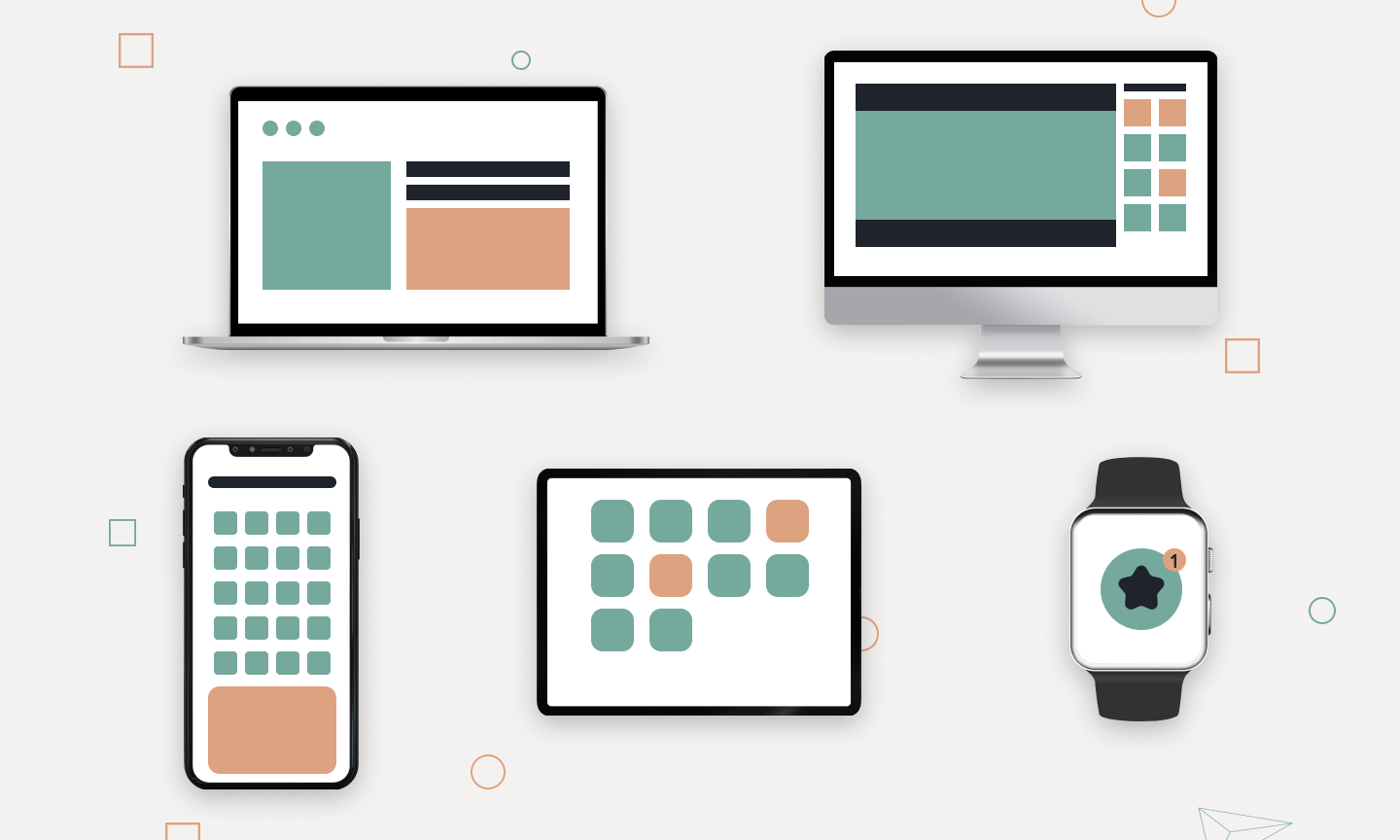
In an ideal value chain, sales benefits from the work of marketing and AI & ML technologies inspire marketers to hold all the marketing activities across all the customers’ devices depending on context and message.
By analysing cookies and device IDs, AI systems will allow marketers to reach users precisely at the right time on the correct device with granular targeting, so all the company’s clients will not be daunted under the “one-fits-all” ad.
FRAUD DETECTION
AI tools that use natural language processing, computer vision and machine learning can analyze extensive data sets as well as various data sources in real time. On the basis of the data, the AI system can identify abnormal behaviors and create risk scores in order to build a full understanding of each payment transaction.
There are different types of fraud AI & ML can help travel companies to track:
- payment fraud when credit card information is stolen
- fake accounts creation
- content abuse (if they incorporate reviews and other user-generated content)
- account takeover (loyalty fraud)
By incorporating AI-enabled tools, travel companies will be able to decipher trusted payers from those who are not, detect anomalies with high accuracy and speed, and therefore secure online transactions. The integration of AI for decision-making enhances the capacity to assess transactional patterns, rapidly identify potential risks, and make informed choices to bolster the overall security of online financial transactions in the travel industry.
Bottom Line
With a vast variety of cool shiny things that Artificial Intelligence and Machine Learning suggest, it’s easy to catch the spark and knuckle down with the “I want it all” thought. Remember that technology works good only when it is properly implemented. Consider the following things and fuel those technologies in your business:
- Gather quality data. They say “garbage in – garbage out” which is harsh, yet true. It’s extremely important how rich the data is, whether it is joinable, and how it is labelled as data quality directly impacts the output of the model. A data scientist might help you sort those datasets out and build that whole system.
- Know your product. Yes, that may sound like “thanks, Captain Obvious,” but actually it’s the starting point of implementation of any technologies. We at Django Stars tell our clients that we can build the algorithm of any sophistication, yet the product owner has to clearly understand how to plug & play those algorithms, what are the business goals, and how should it work.
- Consider the maturity of your business. Incorporating Artificial Intelligence is a tough call which requires very good domain knowledge, advanced skills and the knowledge of legal restrictions (e.g. data capturing regulations). Which is why you could consider engaging engineers to assist, as it’s quite hard to find and keep the engineers in-house.
- Focus on what matters most. There’s a little chance to succeed with “all-you-can-eat” approach. Some models give only 5% improvement, but on a large scale, that is a substantial progress that brings better experience and revenues. On the other hand, focusing on AI chatbots might free up your personnel and bring customer experience to the new levels.
If you are looking for an experienced development team to ensure your travel service is to the highest standard, contact Django Stars.
- How can AI and ML be used to personalize travel experiences for customers?
- AI and ML can analyze large datasets on customer behavior and preferences, including past travel itineraries, social media activity, and search history. This data can then be used to provide personalized recommendations for travel destinations, accommodations, activities, and more. For example, an AI-powered chatbot can assist travelers in finding the best flights and accommodations based on their budget and preferences. Also, travel providers can offer customers some predictions based on AI analytics.
- How can travel companies implement AI & ML without losing the human touch?
- Travel companies can use AI to augment customer service, not replace it: AI-powered chatbots and virtual assistants can help customers with basic queries and tasks, but there should always be an option for customers to speak with a human representative if needed.
- They can incorporate human oversight and review to ensure that AI and ML algorithms are making accurate and ethical decisions.
- Also, they can use natural language processing for customer service interactions, and incorporate feedback loops to continuously improve the AI & ML algorithms.
- Additionally, transparency in how data is collected, used, and protected can help build trust with customers and alleviate concerns about AI and ML being too impersonal.
- What are the potential future app ideas of AI/ML in the travel industry?
There are many potential future app ideas for AI/ML that have the potential to revolutionize the travel industry, for example:
- Personalized trip planning
- Real-time speech and text translation
- Predictive maintenance for planes, trains, and other modes of transportation
- Dynamic pricing based on supply and demand
- Augmented reality (AR) travel guides
- How can AI be used to improve the safety and security of travelers?
Travel companies can use AI to improve the safety and security of travelers in various ways. For example:
- AI can help assess the risk of a destination by analyzing a wide range of data such as crime rates, weather patterns, political stability, and health risks. This information can be used to advise travelers and guide their decisions.
- To detect fraudulent activities such as identity theft and credit card fraud, AI can analyze patterns and anomalies in data.
- AI can be used to detect potential threats such as suspicious behavior, objects, or movements in public areas. It can also monitor social media and other online sources for potential threats.
- AI can analyze real-time data and provide instant information to emergency services for emergency response. For example, AI can detect traffic jams or accidents and alert emergency services to send help.
- AI can help monitor travelers' health and detect potential health issues by analyzing data from wearable devices or other sensors.







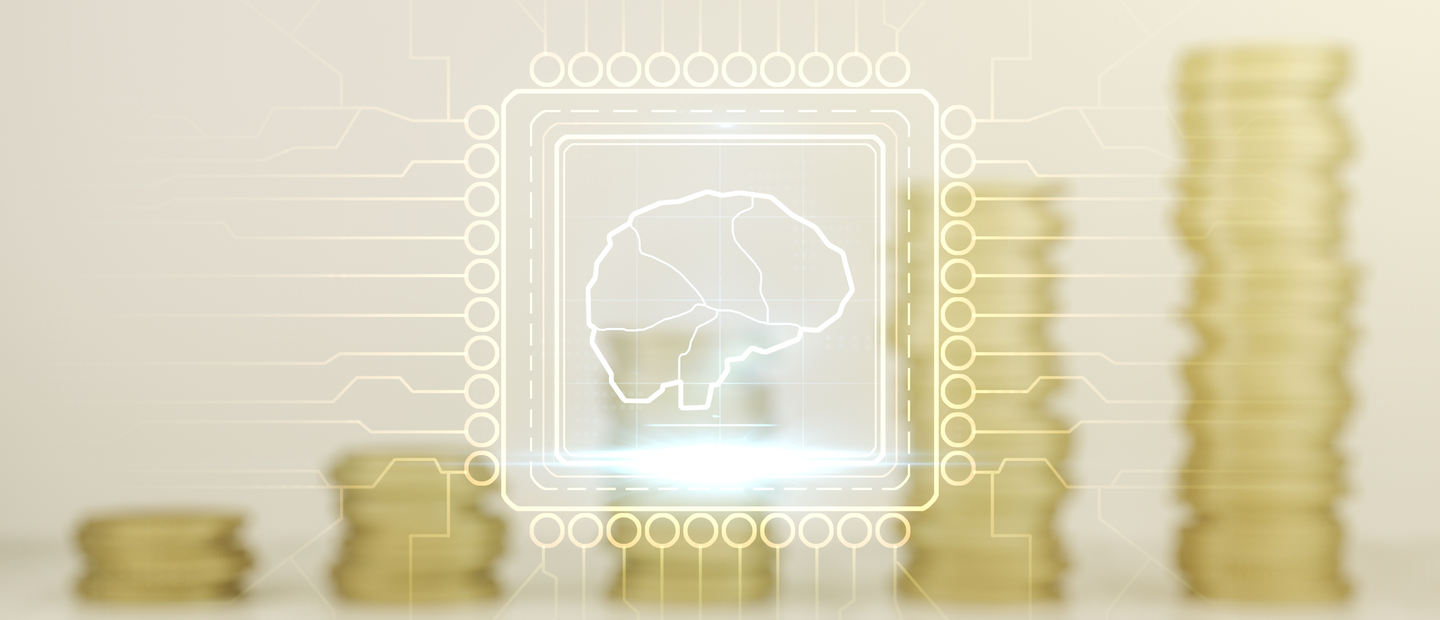


Всего комментариев: 0